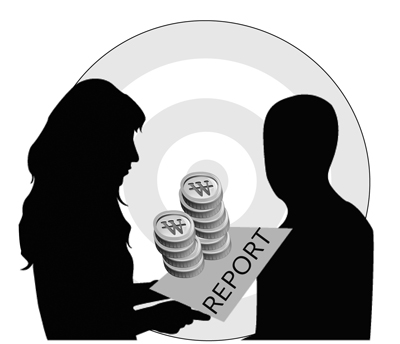Secondary trade of other people’s work indicate infringement on copyrights

Knowledge trading portal sites comes in a myriad of choices where students can buy reports that are uploaded and register their own reports to make a profit.
Students seeking profit are often tempted to use other people’s work to raise their total number of uploaded reports due to the policy set by the knowledge trading portal sites.
“At first I was able to earn enough pocket money by uploading my reports,” said a student who used to upload other people’s work, preferring to stay anonymous.
According to the student, the portal sites have a fixated trading unit policy where uploaders cannot withdraw their profits unless the total income meets such unit.
“I started out to raise my total profit and later changed to upgrading my rating on the Web site. The higher my ratings went the less I had to compensate for commission I needed to pay when trading on the Web site, which is an offer most people cannot overlook,” the student said.
In October 2010, a student at Seoul National University uploaded approximately 350 reports written by other students’ and similar happenings occur at Ewha.
“I once found one of the team projects that I worked on uploaded on a Web site to be sold,” said an Ewha student who wished to stay anonymous. “Looking through the previews displayed, I could identify that the report was ours and felt betrayed by whoever pirated the file.”
Numerous knowledge trading portal sites present phrases and advertising slogans that mollify the sense of guilt from doing something illegal. For instance, these knowledge trading portal sites advertises that the Web site is a knowledge sharing marketplace where anyone can earn money by registering a report that has been erased or is forgotten.
Such phrases develop a mindset that makes it seem reasonable to upload files that are not one’s own from a public computer used by many students.
“The word ‘sharing’ gives a positive nuance which creates an atmosphere to grab the opportunity to claim a report even if it is someone else’s,” professor Yang Yoon (Psychology) said. “Since the advertising phrases do not specifically state that the uploaded files have to be one’s own, such unlawful actions occur.”
Students who know about the problem feel the need to be more careful when using public computers in computer labs.
“I believe such illegal uploading indicate how many Korean students are still not serious about the importance of copyrights,” Lee Na-kyeong (Yonsei University, 2) said. “Students should realize that using other peoples’ writings without their permission is also a clear act of theft.”
The Cyber Terror Response Center (CTRC) acknowledges the problem of illegal trading of university reports on-line.
“Students should recognize that theses uploadings are definitely a crime that violates the copyright laws,” said Son Ki-eon, the head officer of the cyber investigation team at the CTRC center in Seodaemun-gu area. “If such actions continue to be reported, we will eventually investigate and take legal actions against the offenders.”
Hur Jin
cookiekat@ewhain.net

